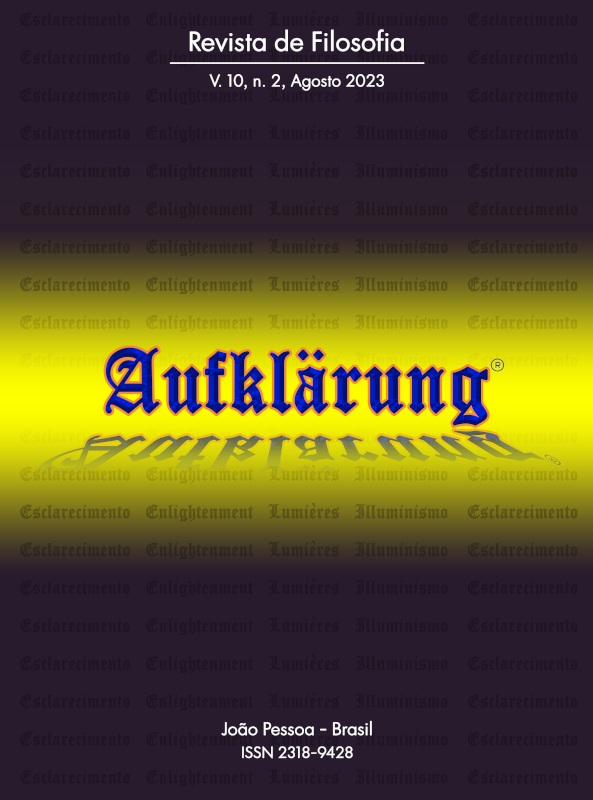Transhumanism and the issue of freedom in the face of moral enhancement
DOI:
https://doi.org/10.18012/arf.v10i2.67284Keywords:
Transhumanism, Moral Enhancement, Ethics, FreedomAbstract
Transhumanisms, as cultural, philosophical, and ideological movements that permeate various areas of technical and scientific knowledge, have caused a rupture in Western philosophical praxis by asserting the possibility of genetic enhancement of the human being through biotechnoscientific procedures. However, the biophysical alterations advocated by transhumanists are not limited to the somatic and psychic realms; they encompass humanity as a whole, including moral aspects. In this sense, the aim of this article is to demonstrate the ethical and political impacts concerning human moral enhancement, highlighting to what extent our freedom may be threatened by such practices. After all, is it possible to genetically enhance our morality? Should we enhance our dispositional moral traits through biotechnoscientific procedures? Faced with these questions, we will first analyze how human moral enhancement can interfere with our freedom as human beings, and then we will examine how human enhancement has become a moral urgency for transhumanists.
Downloads
References
BOSTROM, Nick. Em defesa da Dignidade Pós-Humana. Bioethics, v. 19, n.3, 2005, pp. 202-214.
BOSTROM, Nick. Una historia del pensamiento transhumanista. Argumentos de Razón Técnica, nº 14, 2011, pp. 157-191.
BUCHANAN, Allen. Human Nature and Enhancement. Bioethics, v. 23, nº 3, 2009, pp. 141-150.
DECLARAÇÃO TRANSUMANISTA. In.: BOSTROM, Nick. Una historia del pensamiento transhumanista. Argumentos de Razón Técnica, nº 14, 2011, pp. 157-191.
DIAS, Maria Clara. Aprimoramento humano: entre equívocos e desafios.Filosofia Unisinos – Unisinos Journal of Philosophy – 17(3):352-360, sep./dec. 2016.
HARARI, Yuval Noah. 21 lições para o século 21. Tradução de Paulo Geiger. São Paulo: Companhia das Letras, 2018.
HARRIS, John. Enhancing evolution. The ethical case for making better people. Princeton and Oxford: Princeton University Press, 2007.
HARRIS, John. Moral Enhancement and Freedom', Bioethics25 (2), 2011, pp. 102-11.
HAUSKELLER, Michael. Better humans? Understanding the enhancement project. Durham: Acumen, 2013.
HAUSKELLER, Michael. Como se tornar um pós-cachorro: os animais no transhumanismo. In.: OLIVEIRA, Jelson. Filosofia animal: humano, animal, animalidade. Curitiba: PUCPress, 2016a, pp. 405 – 416.
HAUSKELLER, Michael. Mythologies of transhumanism.Exeter: Palgrave Macmillan, 2016b.
HUGHES, James. Citizen Cyborg. Why Democratic Societies Must Respond to the Redesigned Human of the Future.Cambridge, MA: Westview Press, 2004.
JONAS, Hans. O princípio responsabilidade: ensaio de uma ética para a civilização tecnológica. Trad. Marijane Lisboa, Luiz Barros Montez. Rio de Janeiro: Contraponto: Ed. PUCRio, 2006.
KAEBNICK, Gregoriy E. Moral enhancement, enhancement and sentiment. In.: CLARK, Steve; SAVULESCU, Julian; COADY, C. A. J.; GIUBILINI, Alberto; SANYAL, Sagar. The ethics of human enhancement: understanding the debate. Oxford: Oxford University Press, 2016, pp. 225 – 238.
MIRANDOLA, Giovanni Pico Della. Discurso sobre a dignidade do homem. Rio de Janeiro: Edições 70, 1989.
More, Max. “A Letter to Mother Nature”, in.: MORE, Max; VITA-MORE, Natasha. The Transhumanist Reader. Chichester: Wiley-Blackwell, 2013, pp. 449-450.
PERSSON, Ingmar; SAVULESCU, Julian. Inadequado para o futuro:a necessidade de melhoramentos morais. Tradução Brunello Stancioli. Belo Horizonte: Editora UFMG, 2017.
SAVULESCU, Julian. Procreative beneficence: why we should select the best children", Bioethics 15 (5-6), 2001, pp. 413-426.
STOCK, G. Redesigning Humans: our inevitable genetic future. New York: Houghton Mifflin Company, 2002.
WALKER, Mark. Prolegomena to any future philosophy, Journal of evolution and technology 10, 2002. Disponível em: https://www.jetpress.org/volume10/prolegomena.html. Acesso em 10 de maio de 2021.
Additional Files
Published
How to Cite
Issue
Section
License

This work is licensed under a Creative Commons Attribution 4.0 International License.
Journal general policy
1.This journal works under a Creative Commons License aplied to online journals. That icence can be read in the following link: Creative Commons Attribution 4.0 International (CC BY 4.0).
2.Accordingly to this License, a)the journal declares that authors hold the copyright of their articles without restrictions, and they can archieve them as post-print elsewhere. b)the journal allow the author(s) to retain publishing rights without restrictions.
Metadata Policy for information describing items in the repository
1. Anyone may access the metadata free of charge at anytime.
2.The metadata may be re-used in any medium without prior permission, even commercial purposes provided the OAI Identifier or a link to the original metadata record are given, under the terms of a CC BY license refered for the Journal.







































